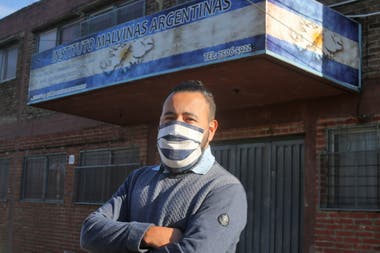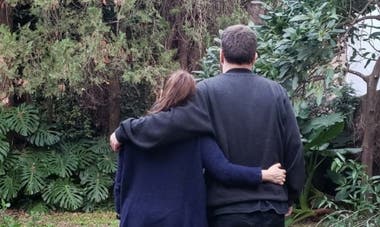Boys and girls whose parents did not finish school, who have to work to help their families, without access to basic services and, in many cases, neither to computers, cell phones or the Internet. A situation that is repeated in many vulnerable neighborhoods in Argentina and with which Professor Alejandro Barbosa has been used to dealing with for many years. However, everything was exacerbated by the pandemic And, during the more than four months that he has been in quarantine, this teacher had to think of new strategies so that his students at the Escuela Malvinas Argentinas school, located steps away from the La Matera settlement, in Quilmes, do not run out of classes and end up dropping out. His studies.
One of his first initiatives was to bring the teams from the computer room of the school that were in disuse by the quarantine. But the most important innovation for him was understanding that he had to become a teacher “full time”. “In virtual education, one receives messages on unforeseen days and times and you have to respond understanding that this is the time when boys and girls were able to connect. Many times, there is only one cell phone at home and the mother or father tells them they take them when they go out to do trades “, summarizes Alejandro, who is 38 years old and lives in San Francisco Solano, Quilmes.

With a degree in biotechnology, Alejandro could not say when his teaching vocation was born, because he feels that this mission was always within him, as well as the need to teach in socially excluded contexts: villages, settlements and prisons. In 2013, he started the Enseñá x Argentina Social and Educational Leadership Program, which allowed him to develop the tools to become “an agent of change” for your students. He never imagined that a pandemic would lead him to rethink teaching strategies. “The current context made me have to get a new version of myself. We are not used to this type of totally distance education and the first thing I had to bear in mind is that today more than ever we must have a lot of empathy with the reality of our lives. students “, assures Alejandro.
That empathy was what pushed him to start, with the collaboration of Enseña x Argentina, a campaign to collect disused computers, since those that were in the school and that during the quarantine were distributed to boys and girls, they were not enough. “Even the oldest women are useful to us, for us it is a very important tool so that young people are not left out of the system,” says Alejandro and clarifies that they still need more machines.
The fact that the students were able to take the computers had a great impact on them. “They value it very much. Inside the classroom we try to make everyone the same, but with distance education, each family is a different reality. For those without computers it was very hard to see that their classmates could connect with the school and they could not. Feel that due to their economic condition they are left out of that right is very strong “, describes Alejandro.
Break prejudices
For eight years, Alejandro has been a teacher of all the exact subjects in the Malvinas Argentinas School. Most of his students live in La Matera, a settlement crossed by the lack of basic services, where houses of material alternate with boxes built with wood and nylon among the garbage. The families survive, mainly, on monkeys. “It is a neighborhood complicated by drugs and that floods a lot, because it is adjacent to a stream. All these factors have an impact on boys and girls being able to attend school,” says the teacher.

Until he came to Enseñá x Argentina, Alejandro had given private classes and worked at the Faculty of Exact and Natural Sciences of the UBA as a researcher. “I always had that little bug inside me saying: at some point you have to dedicate yourself to what you love the most. It’s not that I didn’t want to be a scientist, but becoming a teacher was one of my dreams and I had to make a decision,” recalls Alejandro, who stepped aside in the laboratory and devoted himself fully to education.
For him, the pandemic implied not only being fully available through email or WhatsApp, but attend to the particularities of each student. “The preceptors are very important because they do follow-up work and tell us what is happening with the families, if they are having health problems or without work, for example,” says Alejandro. And she adds: “We have to juggle and adapt. Today education has become very personalized, we are addressing a particular student given their situation.” Is not easy. It has about 35 students per course, about 100 in total. However, that no one loses “that very important right to be educated” is essential for the teacher.
He lived it firsthand. He says that he comes from a “very humble” family. “My dad always instilled in me that studying was going to give me the tools to get ahead and I am a witness that this is true. Many of the boys who grew up with me and who did not have the opportunity that I had to study ended up dying because of the drugs. I meet others when I go to teach at the prison, “says Alejandro.

In the Florencio Varela prison, he teaches in units 24, 32, 42. When the opportunity arose five years ago, Alejandro was certain that he could not see it as just another job: “I wanted to think about what I could offer them. of teachers mark people “. Seeing the best way to reach his students, he designed a curriculum in which He taught them mathematics from elements of construction, painting and carpentry. “I feel very good because i think i’m working with a change agent. Today I keep in contact with many of those who finished their sentences and I allow myself to feel a little proud to see them with the title, although the credit is theirs, “he confesses.
To be leading a class with boys and girls who live in settlements or villages or in a prison classroom, Alejandro says that the first thing is to shake off prejudices and not condition students. Working in these contexts motivates her because each contribution can be fundamental: “The teacher is a little flame, I am not saying that she will illuminate the paths of all, but some that are so dark that that light acquires an important intensity and can change That is where something that is not learned in books comes into play: the ability to generate the bond between the teacher and his students, “from there learning will begin to be created.”
During quarantine, staying in contact with your students in jail is extremely complex. But he does what he can. “Visitors cannot enter due to the risk of the virus entering. Therefore, we prepare booklets with different subjects and activities, we deliver them and we look for them. However, it is complicated because they have no one to consult,” he laments.
One of his dreams for the future is to deploy with his students projects that generate a positive impact on the community: that are initiatives that leave the school and seek to solve specific problems, for example, making canes and walkers for the elderly or with disabilities. “We build the school together, it does not have to be a name or an establishment but an agent of change”, he concludes.
More information
- Alejandro and his school need computer donations so that more students can connect during the quarantine. All devices work. To collaborate, write to Alejandro at: [email protected]
Fundación La Nación Award for Education: Organized by Fundación La Nación together with Banco Galicia and Osde, it launched its 14th edition with the support of Cimientos, Proyecto Educar 2050, VIACOM-CBS, Fundación Varkey and the University of San Andrés. This year, we seek to highlight the incessant work of teachers who during the pandemic develop innovative pedagogical strategies to ensure the educational continuity of their students in vulnerable contexts. The application is open until October 2, 2020 and only initiatives that have been developed in the context of the pandemic can be submitted. Among the participating schools, three winners will be selected who will receive 300,000 pesos each and, also, three special mentions will be awarded that will receive 100,000 pesos each to invest in the training of the teachers involved and the equipment of the school to facilitate access to the Communication technologies. Likewise, they will be given dissemination of their initiatives and training on various topics related to the teaching-learning process. To apply, schools must complete all the required information in the online application form available on the website. More information: write to [email protected] or call the cell phone: 11-4915-9533. Terms and conditions at: www.fundacionlanacion.org.ar/premio
Enseñá x Argentina: during the pandemic, many of the activities with teachers and students were transformed without losing their essence. As many of the boys and girls they accompany do not have Internet access, they work in a much more personalized way. In addition, they have weekly and open proposals for virtual learning meetings for teachers, on how to plan and adapt different activities, for example, how to use WhatsApp as a pedagogical tool or how to work on Comprehensive Sexual Education (ESI) in this context. On the other hand, they offer boys and girls “learning capsules” to develop socio-emotional and academic skills, with activities that are shared by WhatsApp. They have a cycle of virtual interviews every week with voices from different fields of education and promoted a learning community among managers. All the activities are open and are communicated on their social networks like Facebook and Instagram.
.
Publicado en el diario La Nación




